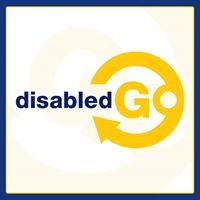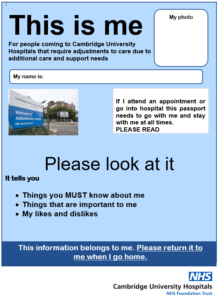Hospitals
 Visiting hospital clinics or staying in hospital can be a challenge for many people and for some of our children and young people it needs careful planning and support.
Visiting hospital clinics or staying in hospital can be a challenge for many people and for some of our children and young people it needs careful planning and support.
Most of our children will be treated locally and the local hospital’s Learning Disability Nurse / Advisor will be able to offer help and answer questions. Great Ormond Street Hospital is so used to dealing with children’s needs its website has some useful information to help support your child.
Locally we also helped co-produce a ‘hospital passport‘ to help make your child’s visit a little smoother.
Learning Disability Nurses / Advisors in our local hospitals
How can they help and how can you contact them
The Learning Disability Nurse understands the needs of people who have a learning disability and/or autism, and also
understands how hospitals work. Nurses/Advisors can work with the hospital to help you get the care, treatment and tests your child or young person needs. Addenbrooks have a guide to their services as to Hinchingbrooke and Peterborough Hospitals
We have a nurse or advisor in each of the local hospitals. You can find out more about the service and how to contact them on the easy read guide they have produced.
You can also find out about our health passports which mean you only need to provide the information once!
Preparing for Hospital
Going into hospital can be a challenge and preparing ahead of time helps. We’ve collated some resources that may help. Most hospitals also have a dedicated nursing role that can support SEND families and children.
Preparing your child for hospital stays
This NHS video is to help parent carers know what to expect. The Evelina Children’s hospital have a useful information that would apply to all hospitals, Mencap several booklets to help parent carers prepare (see bottom of the linked page) and the BBC also have a guide for parent carers too.
The Charity What? Why? also have a range of videos to help you including this one for parent carers. They also have free printable colouring activities which feature hospitals.
Easy Read Guides
Great Ormond Street Children’s Hospital have produced these GOSH easy read guides for many common hospital procedures.
You’ll find lots more easy read guides on this website, many of which may work well for older children and young adults.
Communication aids specific to hospitals and medicine
You can supplement your usual aids with some designed to cover hospital and medical words and activities.
Picture Stories that include medical procedures can be found here.
Common procedures explained – cards
The What? Why? Charity have a number of information cards that explain common procedures.
Video clips that explain common procedures
The What?Why? Charity have videos covering a wide range of common procedures.
GOSH also cover a wide range of other treatments which may be relevant to your child, even if they are not attending this hospital.
CBeebies has Dr Ranj’s Hospital Top Tips and their Get Well Soon series
Explaining mask wearing
Making Friends with your Face Mask video – this video is for people with learning disabilities to help them understand why wearing a face mask is important, how to find a face mask that suits them and how to get used to wearing it.
Supporting a person with a learning disability to wear a face mask – this video is for family members or carers of people with learning disabilities to help them understand why wearing a face mask is important, how to find a face mask that suits the person they support and how to help them get used to wearing it.
Hospital and Healthcare Passports
Creating a passport-style document for your child can be really useful for healthcare and hospital appointments as well as after school activities or emergencies.
You can download a template and then personalise it with important information about your child or young person. It’s helpful for hospital staff, dentists, PAs and other people working with your son or daughter, and can include communication needs, support needs, medication, as well as things that are important to your child, their likes and dislikes.
Pinpoint worked with parents and Addenbrooke’s Hospital to create an Additional Needs passport for children and young people attending the hospital. There are child and adult versions.
We also have a general healthcare passport template. Use it at hospitals, clinic visits or GP appointments. Or keep a spare for holidays or one in the car glovebox in case of emergency.
Mencap and NHS England created a short emergency version for the COVID-19 outbreak to enable healthcare professionals to know immediately about your child’s needs.
- Download the Cambridge University Hospitals Patient Passport
- Download a general Healthcare Passport
- Download the 2020 COVID-19 ‘Grab and Go’ Healthcare Passport
Our parents say…
“My son had to have an operation at Addenbrooke’s hospital. He is on the autistic spectrum, so I prepared a hospital passport before our visit. The ward staff recognised the passport, welcomed it and read it and used it help prepare my son for what was going to happen. They noted from the passport what sort of toys he likes and brought these for him to play with while he was waiting. All of the ward staff were helpful, they all took time with him, making sure that he was happy with everything that happened.
This could have been an extremely negative experience for my son, because of waiting, not knowing what would happen or when, being operated on and feeling poorly. However, the hospital passport helped us to have a positive experience because my son was told what would happen, was entertained while he waited and was given as much help as possible to feel better after the operation.“
Access guides: Addenbrooke’s, The Rosie and Hinchingbrooke
How accessible are Cambridgeshire’s main hospitals?
 disabledGO has online guides to the three big hospitals, with sections on main entrances, wards, departments and clinics as well as car parks, loos and cafes.
disabledGO has online guides to the three big hospitals, with sections on main entrances, wards, departments and clinics as well as car parks, loos and cafes.
If you are planning a visit, you can head to the disabledGO website and find out about more, including level access, accessible changing rooms, hearing systems and sign language.

